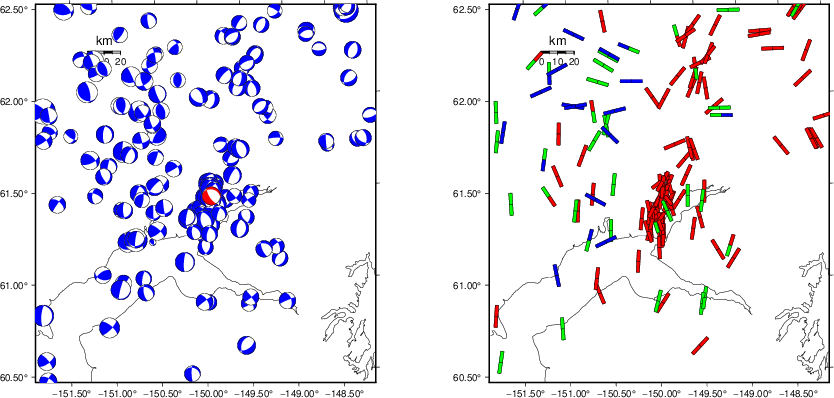Location
Location ANSS
The ANSS event ID is ak019i8au86 and the event page is at
https://earthquake.usgs.gov/earthquakes/eventpage/ak019i8au86/executive.
2019/01/11 02:33:38 61.471 -149.899 49.8 4.6 Alaska
Focal Mechanism
USGS/SLU Moment Tensor Solution
ENS 2019/01/11 02:33:38:0 61.47 -149.90 49.8 4.6 Alaska
Stations used:
AK.BRLK AK.CAST AK.CUT AK.FIRE AK.GHO AK.KNK AK.RC01 AK.SAW
AK.SKN AK.SLK AT.PMR AV.STLK TA.M22K TA.O22K
Filtering commands used:
cut o DIST/3.3 -30 o DIST/3.3 +40
rtr
taper w 0.1
hp c 0.03 n 3
lp c 0.08 n 3
Best Fitting Double Couple
Mo = 7.85e+22 dyne-cm
Mw = 4.53
Z = 58 km
Plane Strike Dip Rake
NP1 150 70 -70
NP2 283 28 -133
Principal Axes:
Axis Value Plunge Azimuth
T 7.85e+22 22 225
N 0.00e+00 19 323
P -7.85e+22 60 89
Moment Tensor: (dyne-cm)
Component Value
Mxx 3.37e+22
Mxy 3.32e+22
Mxz -2.03e+22
Myy 1.37e+22
Myz -5.35e+22
Mzz -4.74e+22
##############
-#####################
----########################
---------------------#########
----###--------------------#######
--######-----------------------#####
-#########------------------------####
-##########-------------------------####
############-------------------------###
##############------------- ---------###
###############------------ P ----------##
################----------- -----------#
#################------------------------#
#################-----------------------
##################----------------------
##################--------------------
##### ###########-----------------
#### T #############--------------
## ##############-----------
#####################-------
#####################-
##############
Global CMT Convention Moment Tensor:
R T P
-4.74e+22 -2.03e+22 5.35e+22
-2.03e+22 3.37e+22 -3.32e+22
5.35e+22 -3.32e+22 1.37e+22
Details of the solution is found at
http://www.eas.slu.edu/eqc/eqc_mt/MECH.NA/20190111023338/index.html
|
Preferred Solution
The preferred solution from an analysis of the surface-wave spectral amplitude radiation pattern, waveform inversion or first motion observations is
STK = 150
DIP = 70
RAKE = -70
MW = 4.53
HS = 58.0
The NDK file is 20190111023338.ndk
The waveform inversion is preferred.
Moment Tensor Comparison
The following compares this source inversion to those provided by others. The purpose is to look for major differences and also to note slight differences that might be inherent to the processing procedure. For completeness the USGS/SLU solution is repeated from above.
| SLU |
USGSMWR |
USGS/SLU Moment Tensor Solution
ENS 2019/01/11 02:33:38:0 61.47 -149.90 49.8 4.6 Alaska
Stations used:
AK.BRLK AK.CAST AK.CUT AK.FIRE AK.GHO AK.KNK AK.RC01 AK.SAW
AK.SKN AK.SLK AT.PMR AV.STLK TA.M22K TA.O22K
Filtering commands used:
cut o DIST/3.3 -30 o DIST/3.3 +40
rtr
taper w 0.1
hp c 0.03 n 3
lp c 0.08 n 3
Best Fitting Double Couple
Mo = 7.85e+22 dyne-cm
Mw = 4.53
Z = 58 km
Plane Strike Dip Rake
NP1 150 70 -70
NP2 283 28 -133
Principal Axes:
Axis Value Plunge Azimuth
T 7.85e+22 22 225
N 0.00e+00 19 323
P -7.85e+22 60 89
Moment Tensor: (dyne-cm)
Component Value
Mxx 3.37e+22
Mxy 3.32e+22
Mxz -2.03e+22
Myy 1.37e+22
Myz -5.35e+22
Mzz -4.74e+22
##############
-#####################
----########################
---------------------#########
----###--------------------#######
--######-----------------------#####
-#########------------------------####
-##########-------------------------####
############-------------------------###
##############------------- ---------###
###############------------ P ----------##
################----------- -----------#
#################------------------------#
#################-----------------------
##################----------------------
##################--------------------
##### ###########-----------------
#### T #############--------------
## ##############-----------
#####################-------
#####################-
##############
Global CMT Convention Moment Tensor:
R T P
-4.74e+22 -2.03e+22 5.35e+22
-2.03e+22 3.37e+22 -3.32e+22
5.35e+22 -3.32e+22 1.37e+22
Details of the solution is found at
http://www.eas.slu.edu/eqc/eqc_mt/MECH.NA/20190111023338/index.html
|
Regional Moment Tensor (Mwr)
Moment
5.214e+15 N-m
Magnitude
4.41 Mwr
Depth
49.0 km
Percent DC
95%
Half Duration
-
Catalog US
Data Source US 3
Contributor US 3
Nodal Planes
Plane Strike Dip Rake
NP1 304 16 -124
NP2 159 76 -81
Principal Axes
Axis Value Plunge Azimuth
T 5.284e+15 N-m 31 241
N -0.144e+15 N-m 9 337
P -5.140e+15 N-m 58 81°
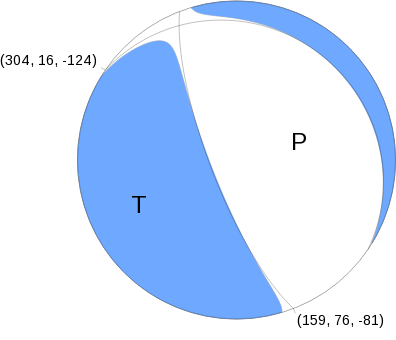
|
Magnitudes
Given the availability of digital waveforms for determination of the moment tensor, this section documents the added processing leading to mLg, if appropriate to the region, and ML by application of the respective IASPEI formulae. As a research study, the linear distance term of the IASPEI formula
for ML is adjusted to remove a linear distance trend in residuals to give a regionally defined ML. The defined ML uses horizontal component recordings, but the same procedure is applied to the vertical components since there may be some interest in vertical component ground motions. Residual plots versus distance may indicate interesting features of ground motion scaling in some distance ranges. A residual plot of the regionalized magnitude is given as a function of distance and azimuth, since data sets may transcend different wave propagation provinces.
ML Magnitude

Left: ML computed using the IASPEI formula for Horizontal components. Center: ML residuals computed using a modified IASPEI formula that accounts for path specific attenuation; the values used for the trimmed mean are indicated. The ML relation used for each figure is given at the bottom of each plot.
Right: Residuals from new relation as a function of distance and azimuth.

Left: ML computed using the IASPEI formula for Vertical components (research). Center: ML residuals computed using a modified IASPEI formula that accounts for path specific attenuation; the values used for the trimmed mean are indicated. The ML relation used for each figure is given at the bottom of each plot.
Right: Residuals from new relation as a function of distance and azimuth.
Context
The left panel of the next figure presents the focal mechanism for this earthquake (red) in the context of other nearby events (blue) in the SLU Moment Tensor Catalog. The right panel shows the inferred direction of maximum compressive stress and the type of faulting (green is strike-slip, red is normal, blue is thrust; oblique is shown by a combination of colors). Thus context plot is useful for assessing the appropriateness of the moment tensor of this event.
Waveform Inversion using wvfgrd96
The focal mechanism was determined using broadband seismic waveforms. The location of the event (star) and the
stations used for (red) the waveform inversion are shown in the next figure.
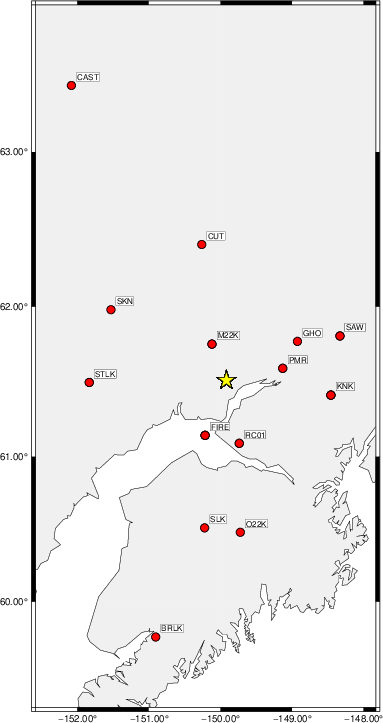
|
|
Location of broadband stations used for waveform inversion
|
The program wvfgrd96 was used with good traces observed at short distance to determine the focal mechanism, depth and seismic moment. This technique requires a high quality signal and well determined velocity model for the Green's functions. To the extent that these are the quality data, this type of mechanism should be preferred over the radiation pattern technique which requires the separate step of defining the pressure and tension quadrants and the correct strike.
The observed and predicted traces are filtered using the following gsac commands:
cut o DIST/3.3 -30 o DIST/3.3 +40
rtr
taper w 0.1
hp c 0.03 n 3
lp c 0.08 n 3
The results of this grid search are as follow:
DEPTH STK DIP RAKE MW FIT
WVFGRD96 1.0 45 85 -5 3.67 0.1947
WVFGRD96 2.0 310 40 90 3.80 0.2410
WVFGRD96 3.0 140 70 30 3.89 0.2640
WVFGRD96 4.0 135 80 20 3.93 0.2926
WVFGRD96 5.0 135 80 15 3.97 0.3138
WVFGRD96 6.0 315 85 -25 3.99 0.3310
WVFGRD96 7.0 315 85 -20 4.02 0.3579
WVFGRD96 8.0 315 85 -25 4.07 0.3855
WVFGRD96 9.0 315 85 -20 4.10 0.4027
WVFGRD96 10.0 315 85 -20 4.12 0.4162
WVFGRD96 11.0 315 85 -20 4.13 0.4236
WVFGRD96 12.0 315 85 -20 4.14 0.4271
WVFGRD96 13.0 315 80 -20 4.15 0.4290
WVFGRD96 14.0 315 80 -20 4.16 0.4296
WVFGRD96 15.0 135 90 20 4.17 0.4289
WVFGRD96 16.0 135 90 20 4.18 0.4295
WVFGRD96 17.0 135 90 20 4.19 0.4280
WVFGRD96 18.0 135 75 0 4.22 0.4302
WVFGRD96 19.0 135 75 5 4.23 0.4322
WVFGRD96 20.0 135 75 5 4.24 0.4340
WVFGRD96 21.0 135 70 0 4.24 0.4338
WVFGRD96 22.0 140 65 5 4.23 0.4349
WVFGRD96 23.0 140 65 5 4.24 0.4368
WVFGRD96 24.0 140 60 5 4.25 0.4381
WVFGRD96 25.0 140 60 5 4.26 0.4397
WVFGRD96 26.0 140 60 5 4.27 0.4411
WVFGRD96 27.0 40 60 -10 4.27 0.4410
WVFGRD96 28.0 40 60 -10 4.28 0.4421
WVFGRD96 29.0 40 30 10 4.26 0.4466
WVFGRD96 30.0 35 30 5 4.27 0.4518
WVFGRD96 31.0 30 25 -5 4.27 0.4581
WVFGRD96 32.0 30 30 -5 4.29 0.4644
WVFGRD96 33.0 25 25 -15 4.29 0.4713
WVFGRD96 34.0 25 25 -15 4.29 0.4767
WVFGRD96 35.0 150 80 -80 4.27 0.4830
WVFGRD96 36.0 150 80 -80 4.28 0.4958
WVFGRD96 37.0 150 75 -75 4.29 0.5088
WVFGRD96 38.0 150 75 -75 4.29 0.5235
WVFGRD96 39.0 150 75 -70 4.30 0.5348
WVFGRD96 40.0 150 75 -80 4.43 0.5349
WVFGRD96 41.0 150 75 -80 4.44 0.5404
WVFGRD96 42.0 150 75 -80 4.44 0.5444
WVFGRD96 43.0 150 75 -80 4.45 0.5510
WVFGRD96 44.0 150 75 -80 4.46 0.5555
WVFGRD96 45.0 150 75 -80 4.46 0.5610
WVFGRD96 46.0 150 75 -75 4.47 0.5658
WVFGRD96 47.0 150 75 -80 4.48 0.5697
WVFGRD96 48.0 150 75 -75 4.48 0.5744
WVFGRD96 49.0 150 75 -75 4.49 0.5786
WVFGRD96 50.0 150 70 -75 4.49 0.5810
WVFGRD96 51.0 150 70 -75 4.50 0.5849
WVFGRD96 52.0 150 70 -75 4.50 0.5894
WVFGRD96 53.0 150 70 -75 4.51 0.5907
WVFGRD96 54.0 150 70 -75 4.52 0.5937
WVFGRD96 55.0 150 70 -75 4.52 0.5952
WVFGRD96 56.0 150 70 -75 4.52 0.5957
WVFGRD96 57.0 150 70 -75 4.53 0.5962
WVFGRD96 58.0 150 70 -70 4.53 0.5964
WVFGRD96 59.0 150 70 -70 4.54 0.5962
WVFGRD96 60.0 150 70 -70 4.54 0.5934
WVFGRD96 61.0 150 70 -70 4.54 0.5938
WVFGRD96 62.0 150 70 -70 4.55 0.5917
WVFGRD96 63.0 150 70 -70 4.55 0.5894
WVFGRD96 64.0 150 70 -70 4.55 0.5864
WVFGRD96 65.0 130 65 -55 4.59 0.5862
WVFGRD96 66.0 130 65 -55 4.60 0.5846
WVFGRD96 67.0 130 65 -55 4.60 0.5824
WVFGRD96 68.0 130 65 -55 4.60 0.5802
WVFGRD96 69.0 130 65 -55 4.61 0.5780
The best solution is
WVFGRD96 58.0 150 70 -70 4.53 0.5964
The mechanism corresponding to the best fit is
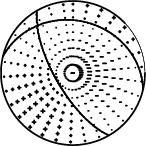
|
|
Figure 1. Waveform inversion focal mechanism
|
The best fit as a function of depth is given in the following figure:
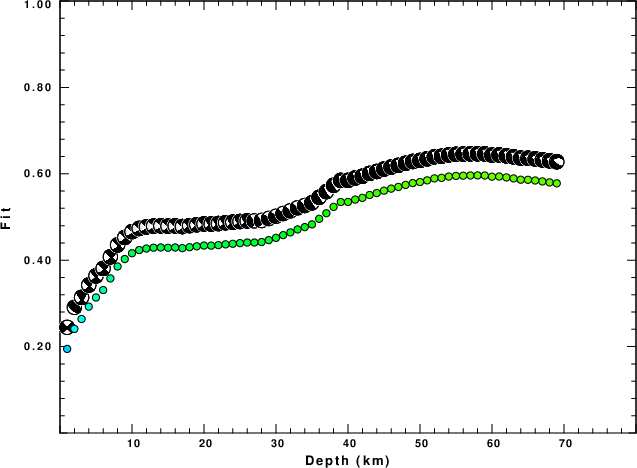
|
|
Figure 2. Depth sensitivity for waveform mechanism
|
The comparison of the observed and predicted waveforms is given in the next figure. The red traces are the observed and the blue are the predicted.
Each observed-predicted component is plotted to the same scale and peak amplitudes are indicated by the numbers to the left of each trace. A pair of numbers is given in black at the right of each predicted traces. The upper number it the time shift required for maximum correlation between the observed and predicted traces. This time shift is required because the synthetics are not computed at exactly the same distance as the observed, the velocity model used in the predictions may not be perfect and the epicentral parameters may be be off.
A positive time shift indicates that the prediction is too fast and should be delayed to match the observed trace (shift to the right in this figure). A negative value indicates that the prediction is too slow. The lower number gives the percentage of variance reduction to characterize the individual goodness of fit (100% indicates a perfect fit).
The bandpass filter used in the processing and for the display was
cut o DIST/3.3 -30 o DIST/3.3 +40
rtr
taper w 0.1
hp c 0.03 n 3
lp c 0.08 n 3
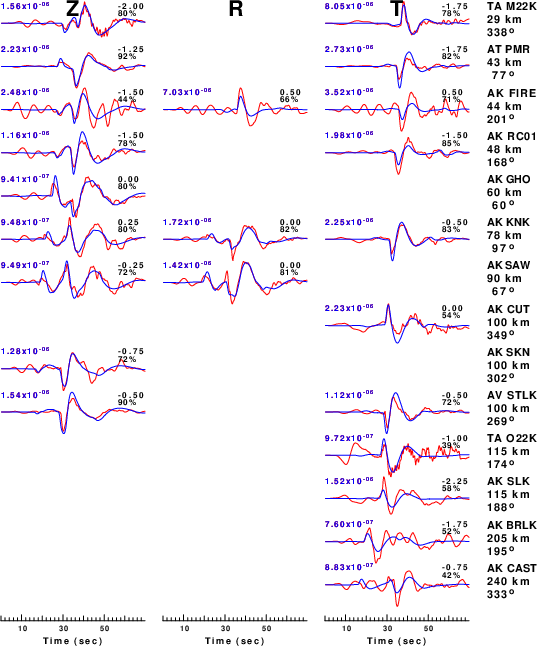
|
|
Figure 3. Waveform comparison for selected depth. Red: observed; Blue - predicted. The time shift with respect to the model prediction is indicated. The percent of fit is also indicated. The time scale is relative to the first trace sample.
|
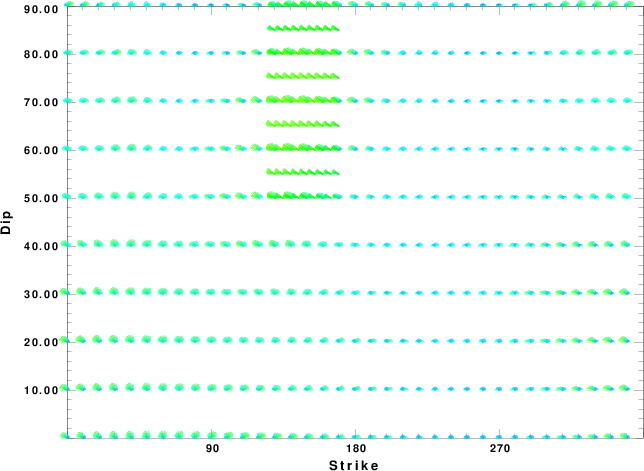
|
|
Focal mechanism sensitivity at the preferred depth. The red color indicates a very good fit to the waveforms.
Each solution is plotted as a vector at a given value of strike and dip with the angle of the vector representing the rake angle, measured, with respect to the upward vertical (N) in the figure.
|
A check on the assumed source location is possible by looking at the time shifts between the observed and predicted traces. The time shifts for waveform matching arise for several reasons:
- The origin time and epicentral distance are incorrect
- The velocity model used for the inversion is incorrect
- The velocity model used to define the P-arrival time is not the
same as the velocity model used for the waveform inversion
(assuming that the initial trace alignment is based on the
P arrival time)
Assuming only a mislocation, the time shifts are fit to a functional form:
Time_shift = A + B cos Azimuth + C Sin Azimuth
The time shifts for this inversion lead to the next figure:
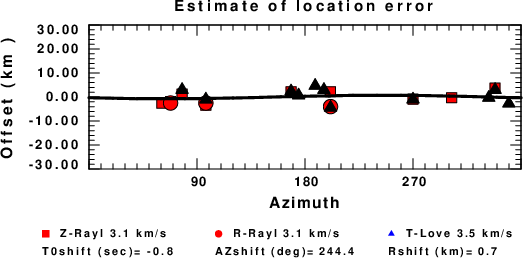
The derived shift in origin time and epicentral coordinates are given at the bottom of the figure.
Velocity Model
The WUS.model used for the waveform synthetic seismograms and for the surface wave eigenfunctions and dispersion is as follows
(The format is in the model96 format of Computer Programs in Seismology).
MODEL.01
Model after 8 iterations
ISOTROPIC
KGS
FLAT EARTH
1-D
CONSTANT VELOCITY
LINE08
LINE09
LINE10
LINE11
H(KM) VP(KM/S) VS(KM/S) RHO(GM/CC) QP QS ETAP ETAS FREFP FREFS
1.9000 3.4065 2.0089 2.2150 0.302E-02 0.679E-02 0.00 0.00 1.00 1.00
6.1000 5.5445 3.2953 2.6089 0.349E-02 0.784E-02 0.00 0.00 1.00 1.00
13.0000 6.2708 3.7396 2.7812 0.212E-02 0.476E-02 0.00 0.00 1.00 1.00
19.0000 6.4075 3.7680 2.8223 0.111E-02 0.249E-02 0.00 0.00 1.00 1.00
0.0000 7.9000 4.6200 3.2760 0.164E-10 0.370E-10 0.00 0.00 1.00 1.00
Last Changed Thu Apr 25 07:51:51 AM CDT 2024



